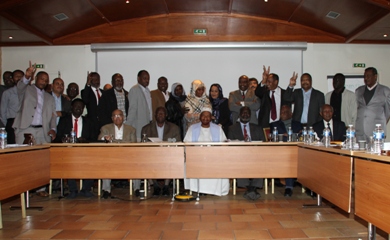Sudanese opposition reiterates call for transitional government
November 13, 2015 (KHARTOUM) – The opposition “Sudan Call” forces have decided to “liquidate” the Sudanese regime and establish a transitional national government either through dialogue or popular uprising.

In a statement extended to Sudan Tribune Friday at the conclusion of its four-day meeting outside Paris, the “Sudan Call” groups decided to form a coordination council including leaders of the various factions to develop the work, documents and structures of the alliance in accordance with the means and mechanisms of the joint action document signed on March 2, 2015.
The meeting further agreed to adopt the joint action charter signed in December, 2014 in Addis Ababa as a charter for “Sudan Call” besides forming a committee headed by the CSI to develop the charter according to the contributions from the political forces, outcome of the alternative policies conference and the input of independent thinkers, intellectuals and experts.
The opposition coalition forces also agreed to put an end of the one-party regime and establish a national transitional government to carry out several tasks including the removal of the empowerment policies, reconstruction and resettlement of refugees and IDP’s, holding the national constitutional conference, holding a census and holding general elections in light of the new constitution.
Several leaders of the ruling National Congress Party (NCP) have rejected this week a proposal calling to form a transitional government filed by the Popular Congress Party (PCP) led by Hassan al-Turabi to the governance and administration committee of the national dialogue conference.
According to the statement, the participants also pledged to apply a transitional justice system to reveal the truth, make reparations and hold accountable those responsible for committing human rights violations, grave crimes and corruption.
The alliance underscored the interdependence between the popular uprising and the comprehensive political solution as means to change the regime.
“The regime wouldn’t accept the transition to the state of the rights and freedoms by begging but by changing the balance of power through intensifying the popular pressure which would put it [regime] before two options : either to accept a consensual negotiated transition or to face an uprising that destroys the bastions of tyranny and corruption,” the statement read.
The alliance further emphasized its acceptance for the African Union (AU) resolution 539, praising the AU Peace and Security Council (AUPSC) call for meeting the requirements of a credible national dialogue that pave the way for a just and true democracy according to the “Sudan Call” document signed on February 28th in Berlin.
The statement further pointed to the alliance commitment to major principles including the transition from exclusion and marginalization to diversity and equal citizenship, from totalitarianism to democracy, from wars and genocides to welfare and peace, from the one-party state to the state of the citizens and from the state of punishment to the state of the rights and liberties.
The “Sudan call” forces called for the establishment of a civil state which guarantees the human rights according to regional and international conventions, commits to the principles of equal citizenship, allows religious and political freedoms and the right of all groups to achieve its objectives by democratic means.
The term “civil state” is used by the Sudanese opposition 0forces to mark their distance from the Islamic state that the ruling National Congress Party intends to build in the country.
The statement stated that Sudan is a decentralized state, saying its constitution must guarantees equitable distribution of power and wealth for the entire regions.
It pointed to the importance for reforming the state’s organs and making it national institutions besides applying an economic system that is based upon social welfare to achieve production efficiency and free competition, eradicate poverty and economic marginalization, provide employment opportunities for the young people and financing education, health, social welfare and the subsidized housing.
The meeting called for the need to establish brotherly relations with South Sudan, besides building balanced regional ties with the African and Arab nations and establishing international relations that are based on equality and mutual interests.
It also pointed to the need to commit to the common human principles such as human rights and the fight against poverty, environmental degradation, organized crime and terrorism.
The Sudanese government will meet in separate talks with the rebel Sudan People’s Liberation Movement/North (SPLM-N) and Darfur armed groups to discuss a truce and humanitarian access in the Blue Nile and South Kordofan and Darfur region.
After what the African mediators will organize another meeting between the government and Paris Declaration groups including the NUP and the SRF on the national dialogue process. The latter are expected to bring the position of the whole opposition forces to the negotiating table.
(ST)
